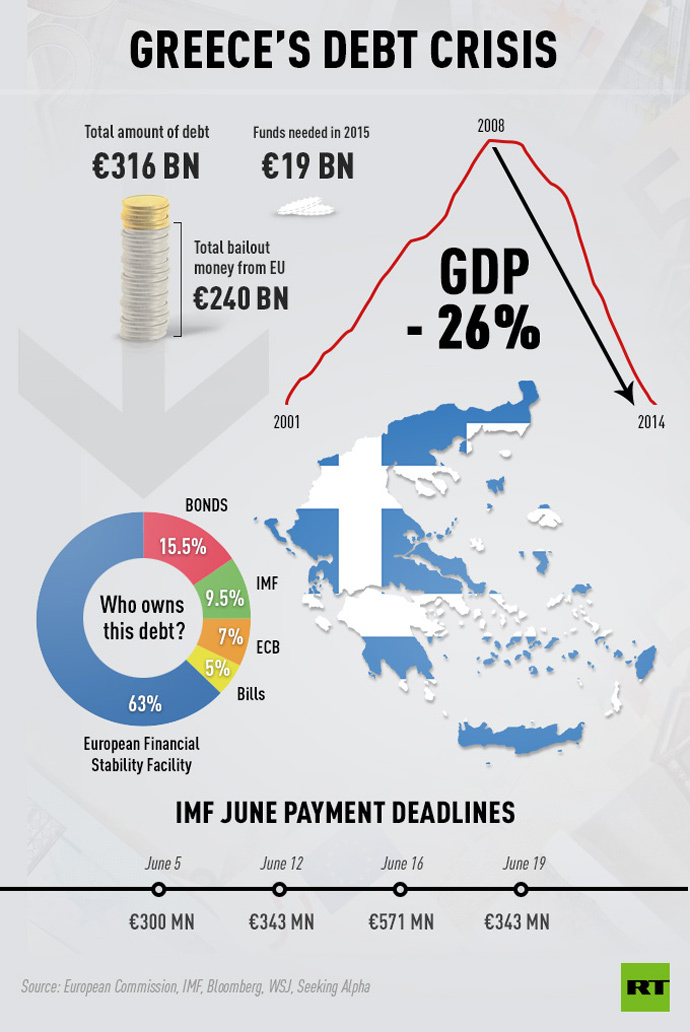Eurogroup refuses to extend bailout program to Greece
The Eurogroup has refused to extend the bailout program to Greece, rejecting PM Alexis Tsipras’ latest request for a new bailout, Finnish Finance Minister Alexander Stubb said at Tuesday’s teleconference.
The Eurogroup rejected two of the three terms proposed by the Greek prime minister Alexis Tsipras, Stubb added.
A third request, for a credit from the ESM, could be considered separately from the emergency procedures currently being used, he said in a tweet.
"Eurogroup ends. Letter of Tsipras includes three requests. Extension of programme or haircut not possible," Stubb tweeted. "Request for ESM-programme is always dealt with through normal procedures."
The Greek government on Tuesday asked for a new bailout program from the European Stability Mechanism (ESM), that would cover all the country’s financial needs for the next two years, according to the government statement.
The request included a restructuring plan for Greek debt to the European Financial Stability Facility that accounts for about 63 percent of the Greece's total debt.
#Eurogroups ends. Letter of @tsipras_eu includes three requests. Extension of programme or haircut not possible...cont...
— Alexander Stubb (@alexstubb) June 30, 2015
Debt crisis: Will Greece exit euro? LIVE UPDATES
Greece’s attitude towards the eurozone and its partners needs to change before a new bailout program can be agreed upon, said Eurogroup chairman Jeroen Dijsselbloem on Tuesday after an emergency conference call between the eurozone’s finance ministers.
“The political stance of the Greek government doesn’t appear to have changed,” he said.
The ministers will hold another conference call at 9:30 am GMT on Wednesday to discuss Greece’s new proposals, he said.
“Eurogroup teleconference set for Wednesday 11:30 am to discuss state of play (with) Greece,” Dijsselbloem tweeted from The Hague.
However, he cautioned that all requests made by Greece would only be considered after any referendum called by the country's government and a new bailout program might require tougher conditions than previously stipulated.
Earlier on Tuesday, the Greek government said it will continue negotiations with the Troika in order to seek a “viable" agreement within the eurozone. Greek Finance Minister Yanis Varoufakis said the country would not meet the IMF payment deadline.
Tsipras said the country is going to face "pressing financial problems" in the second half of 2015 and for all of 2016. This is because Greece hasn’t yet received the last €7.2 billion installment of the second bailout package, and the country didn’t have an access to the international markets. He added that capital controls imposed on Monday were inevitable as emergency assistance to the banks known as ELA was frozen at €89 billion.
Tsipras' letter to the #Eurogroup requesting 3rd bailout, debt restructuring. #Greecepic.twitter.com/ienUCymoVo
— Piers Scholfield (@inglesi) June 30, 2015
Afterthe June deadline to repay €1.6 billion to the IMF expires at 6 pm Washington time today, the IMF will classify Greece as being “in arrears”, which is seen as being virtually the same as default.
Over the weekend Greece’s Prime Minister Alexis Tsipras announced a referendum for July 5, when Greeks would vote whether to accept the latest proposals from the international creditors.
The decision to hold a referendum does not mean an end but the continuation of negotiations with the creditors for more favorable conditions for the Greek people, the statement added.
READ MORE: Greece, eurozone officials agree to extend bailout by 4 months
Some of the top EU policymakers including the European Commission President Jean-Claude Juncker said on Monday that a referendum ‘No’ vote would mean a ‘Yes’ vote for the country’ exit from the eurozone.
However, German Finance Minister Wolfgang Schaeuble said Tuesday Greece can maintain its membership in the eurozone even if the nation votes against austerity reforms on July 5. He said the European Central Bank (ECB) would do everything to protect the euro in case Greece refuses to make concessions during a private meeting with lawmakers in Berlin, media reported.

Greece is not going to default on its debt, but is going to use a strong NO at the referendum on Sunday to strengthen the Greek bargaining position in negotiations with its creditors, George Katrougalos, Greek Minister of Administrative Reforms, told RT.












